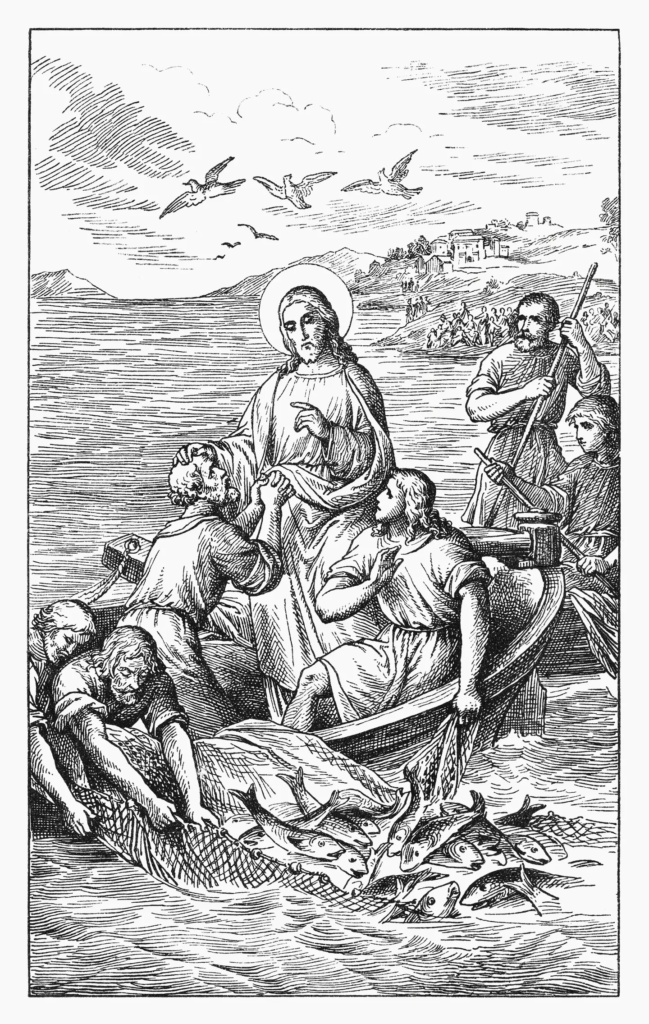Could Science Explain One of Jesus Christ’s Greatest Miracles?

For centuries, the story of Jesus Christ’s miracles has captured the imaginations of believers and skeptics alike. Among these miracles, the “miraculous catch of fish” stands out as a fascinating event that has intrigued many. But what if there was a scientific explanation behind this miracle? Could it be that one of Jesus Christ’s most famous miracles actually has a basis in reality?
While the miraculous catch of fish is one of the most well-known stories from Jesus’ time on earth, it raises questions about the intersection between faith and science. Believers see the miracle as a divine act that demonstrated Jesus’ power and authority, but many skeptics argue that such events may have natural explanations. This debate between faith and science continues to be a thought-provoking subject for both religious communities and those in the scientific field.

The idea that a natural event could coincide with a biblical miracle opens up intriguing possibilities. Some scholars suggest that miracles might not be entirely beyond explanation but could reflect the wonders of the natural world, which were not understood in ancient times. Is it possible that the miracle of the fish catch can be explained by science without taking away from its spiritual significance? This article explores the evidence behind this claim.
User Comments Section
What Do You Think About the Science Behind This Miracle? Share Your Thoughts!
As we explore the potential scientific explanation for the “miraculous catch of fish,” we’d love to hear your perspective. Do you think science and religion can coexist harmoniously? Or do you believe miracles should remain purely in the realm of the divine? Here are some comments from other readers:
Anna M.
“It’s fascinating to think that a natural event could explain a biblical miracle! I’ve always believed in the power of faith, but learning about the fish-kill events on the Sea of Galilee makes me appreciate how nature can work in mysterious ways. The idea that this could be a natural occurrence gives the story a deeper context. I wonder what other biblical events might have natural explanations like this. Check out this article on how fish kills happen in different parts of the world!”
David L.
“I respect the scientific approach, but I believe that miracles are beyond our understanding and should not be reduced to mere scientific explanations. To me, the catch of fish remains a clear sign of Jesus’ divine power. However, I’m open to exploring how natural events could complement miracles. It’s interesting to think about how science and faith might overlap. For a more in-depth look at the intersection of faith and science, I recommend this video on how beliefs shape scientific discovery.”
Rachel P.
“This was a very thought-provoking read! As someone who believes in both science and spirituality, I think there’s no harm in trying to understand the natural world while still embracing the miraculous. What excites me is how we can look at these ancient stories through the lens of modern science and discover new layers of meaning. If you’re interested in how environmental factors can influence human behavior, check out this study on why we are instinctively drawn to bodies of water.”
Michael S.
“I love how this article doesn’t just dismiss the miracle but also opens up the possibility of a scientific explanation. It makes the story feel more accessible to both believers and non-believers. Whether or not you believe in the divine nature of the miracle, this new perspective makes me look at the Sea of Galilee with more curiosity. For those interested in the geography and ecology of the Sea of Galilee, there’s a great resource on its unique ecosystem.”
Jesus Christ: A Historical Figure
Before diving into the possible scientific explanation, it’s important to acknowledge that Jesus Christ is widely regarded by historians as a real historical figure. While his divine nature and the miraculous aspects of his life are a matter of religious belief, there is a strong consensus among scholars that Jesus existed. Much of this knowledge comes from written records from the time, including the works of Roman historians who documented events long before Christianity became the Roman Empire’s state religion.
Despite the fact that much of the narrative surrounding Jesus is centered on religious texts and teachings, secular historians generally accept that Jesus was a real person who lived during the first century CE. The accounts of his life in the Gospels, though written with a religious agenda, also align with other historical sources from that time. Roman historians like Tacitus and Jewish historians such as Josephus mentioned Jesus in their writings, confirming his existence independent of religious traditions.
While the stories of his miraculous deeds are matters of faith, there is no question that Jesus had a significant impact on history. His teachings, life, and eventual crucifixion contributed to the rise of Christianity, which would go on to shape the history of the Western world. In this way, whether or not one believes in the divine nature of Jesus, his place in history is indisputable.
The “Miraculous Catch of Fish”: A Biblical Tale
The story of the miraculous catch of fish appears in two different accounts in the Bible. In both versions, Jesus and his apostles struggle to catch fish, despite a long night of fishing. Just as they are about to give up, Jesus instructs them to cast their nets one more time, leading to an overwhelming catch of fish.
In the Gospel of Luke, this event takes place early in Jesus’ ministry, while the Gospel of John places it after Jesus’ resurrection. According to John, the apostles caught 153 fish, a specific number that has intrigued scholars for centuries. The specificity of the number could have symbolic significance, as some have interpreted it as representing the 153 nations known to the ancient world, suggesting a deeper meaning to the miracle beyond just the physical act of catching fish.

The story holds rich theological implications, symbolizing the call to the apostles to “fish for people” or spread the gospel to the world. Yet, from a purely practical standpoint, the question remains: how could they suddenly make such a miraculous catch after having failed all night? The answer to this question could be found in understanding the unique natural conditions of the Sea of Galilee.
A Scientific Explanation for the Miraculous Catch
While the story of the miraculous catch of fish is undeniably miraculous from a religious standpoint, scientists may have an explanation that aligns with natural phenomena. Researchers from the Kinneret Limnological Laboratory in Israel, who have extensively studied the Sea of Galilee, have discovered an interesting environmental factor that could explain the event.
The Sea of Galilee, located in Israel, is known for a layer of water that is oxygen-deprived. This deeper layer of water is cold and lacks oxygen, making it unsuitable for most fish to survive. When wind and waves stir the water, this oxygen-deprived layer can rise to the surface, bringing with it dead fish. This phenomenon, known as a “fish-kill event,” can occur suddenly and in specific areas of the Sea of Galilee.
Researchers found that these fish-kill events tend to happen near the shore, where the apostles might have been fishing. The fish, unable to escape the oxygen-deprived water, would have died and floated to the surface in large numbers. This provides a plausible explanation for why Jesus and his apostles could have gathered such a large catch, even after hours of unsuccessful fishing. These “fish-kill” events could have created an abundance of fish that would have been easy to scoop up with a net.
The exact timing of these fish-kill events, combined with the location where they occurred, suggests that the environmental factors at the Sea of Galilee could explain the sudden abundance of fish. This scientific understanding does not disprove the miraculous nature of the event but offers a natural explanation that aligns with the biblical account.
Conclusion: Faith, Science, and Miracles
The debate between faith and science often presents complex questions that challenge both religious beliefs and scientific understanding. The story of the miraculous catch of fish, one of Jesus Christ’s most famous miracles, offers a perfect example of this intersection. While science provides a possible explanation for the event, it’s important to remember that miracles, by their very nature, often transcend natural explanations for those who believe in their divine origin.
The potential scientific explanation for the catch of fish doesn’t take away from its religious meaning for believers. For many, the miracle remains a sign of Jesus’ divine power and his role in fulfilling God’s plan. However, for others, the blending of science and religion provides an opportunity for deeper reflection on the wonders of both the natural world and spiritual faith. The story continues to spark discussions about how science and religion can complement each other rather than conflict.
Regardless of whether one accepts the scientific explanation or views the miracle as a supernatural act, the story continues to hold great significance for millions of people around the world. It serves as a reminder of the power of faith, the wonders of nature, and the ongoing dialogue between science and spirituality.
Featured Image Credit: Getty Stock Images






